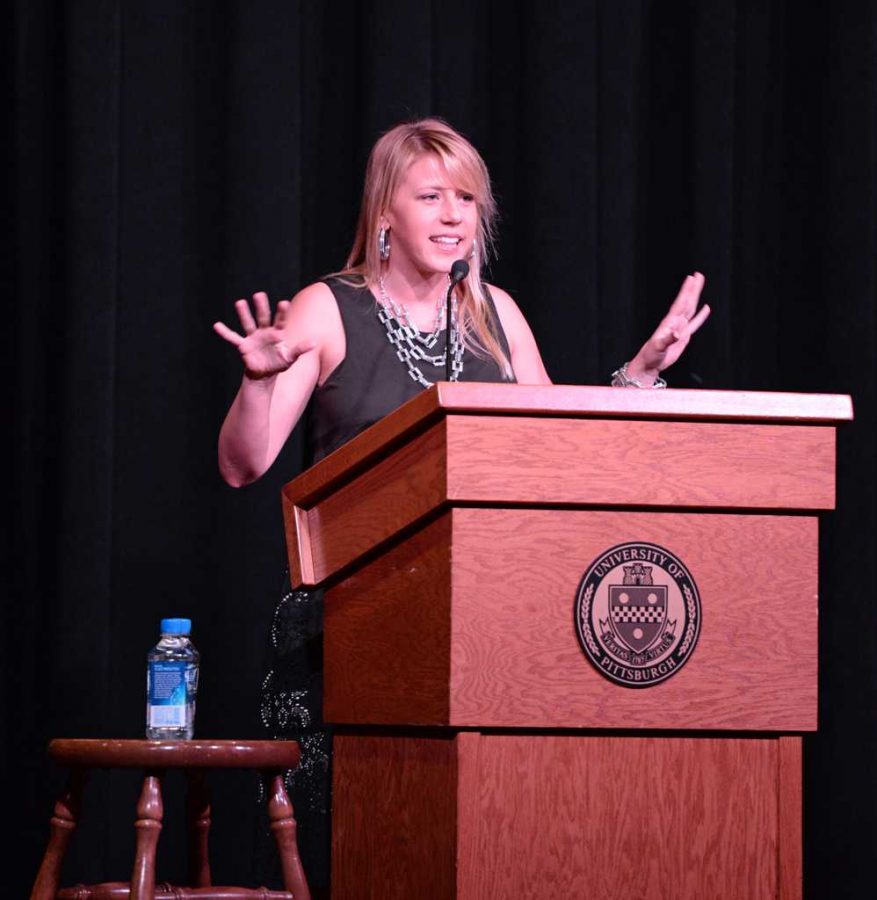Portraying Stephanie Tanner on the show “Full House,” Jodie Sweetin struggled to discover her identity as a child star.
When the show ended, she still felt alone. She turned to alcohol and found “the key to fitting into [her] skin.”
“When I was 13 years old and I picked up my first drink, I felt like I could breathe,” Sweetin said.
Sweetin, known for her role on the ’80s and ’90s sitcom, spoke 8:30 p.m. Wednesday in the William Pitt Ballroom. More than 300 people showed up to hear Sweetin speak about her experience with drug and alcohol addiction at the event hosted by the Pitt Program Council.
Now 34, Sweetin is sober and working on a “Full House” reboot, called “Fuller House.” She tours colleges around the country to speak about her struggle, which she said stems from her complicated family life and acting career.
When Sweetin was born, both her biological mother and father were in prison on drug charges.
Sweetin, who was adopted, landed the role of Stephanie when she was just four and a half years old, after an agent noticed her during a guest appearance on the sitcom “Valerie.”
“Full House” ran for eight seasons, and ended when Sweetin was 13 years old, in 1995. It was the same time her substance abuse issues began.
Sweetin held the room’s attention by flashing her upbeat sense of humor within her serious story.
She joked about relationships and experiences on “Full House,” and spoke candidly about her addiction. During a question and answer session after the event, Sweetin exclaimed upon request, “How rude!” — her catchphrase as the young Tanner daughter.
Jordan Levin, a senior English major, said it was grounding to hear about a celebrity’s drug problem in person.
“It’s really easy to write off a celebrity’s’ drug problem as, ‘Oh duh, another one,’” Levin said. “But it was really interesting to hear about it from her mouth.”
Levin said the actress was “incredibly comfortable” on stage, which made the talk enjoyable despite the heavy content.
Kilian Liptrot, a senior political science and philosophy major, said Sweetin’s autobiographical speech was surprising.
“I expected the talk to be motivational, but it was just her telling her story,” Liptrot said.
Sweetin first tried to get sober when she was 18 years old, then again when she was 22. Each time she tried to detox, she relapsed.
She hid her addiction from her first husband, a Los Angeles police officer, until she woke up in the hospital.
Once tabloids found out she was in rehab after the hospital stay, Sweetin said she could no longer hide her problems.
She began speaking out about her addiction on college campuses and to the media, but said she feigned recovery on tour.
When she had her first daughter at 25, Sweetin said she began to look at sobriety as something that would benefit her as well as her family.
“For the first time, I started getting sober for me,” Sweetin said. “I was doing it because finally I had gotten to a place I was miserable enough and scared enough that I wanted to do it for me.”
Sam Amorim, Pitt Program Council director, said she wanted to bring Sweetin to Pitt because she knew Pitt’s student body was full of “Full House” fans.
“I was really happy and excited for this event,” Amorim said. “She was great to work with — a genuinely nice person.”
After years of lying and being unable to look herself in the mirror, Sweetin said she was happy to finally be sharing her story.
“For me my story isn’t my past, it’s part of who I am,” said Sweetin, “but it’s not [all of] who I am.”


